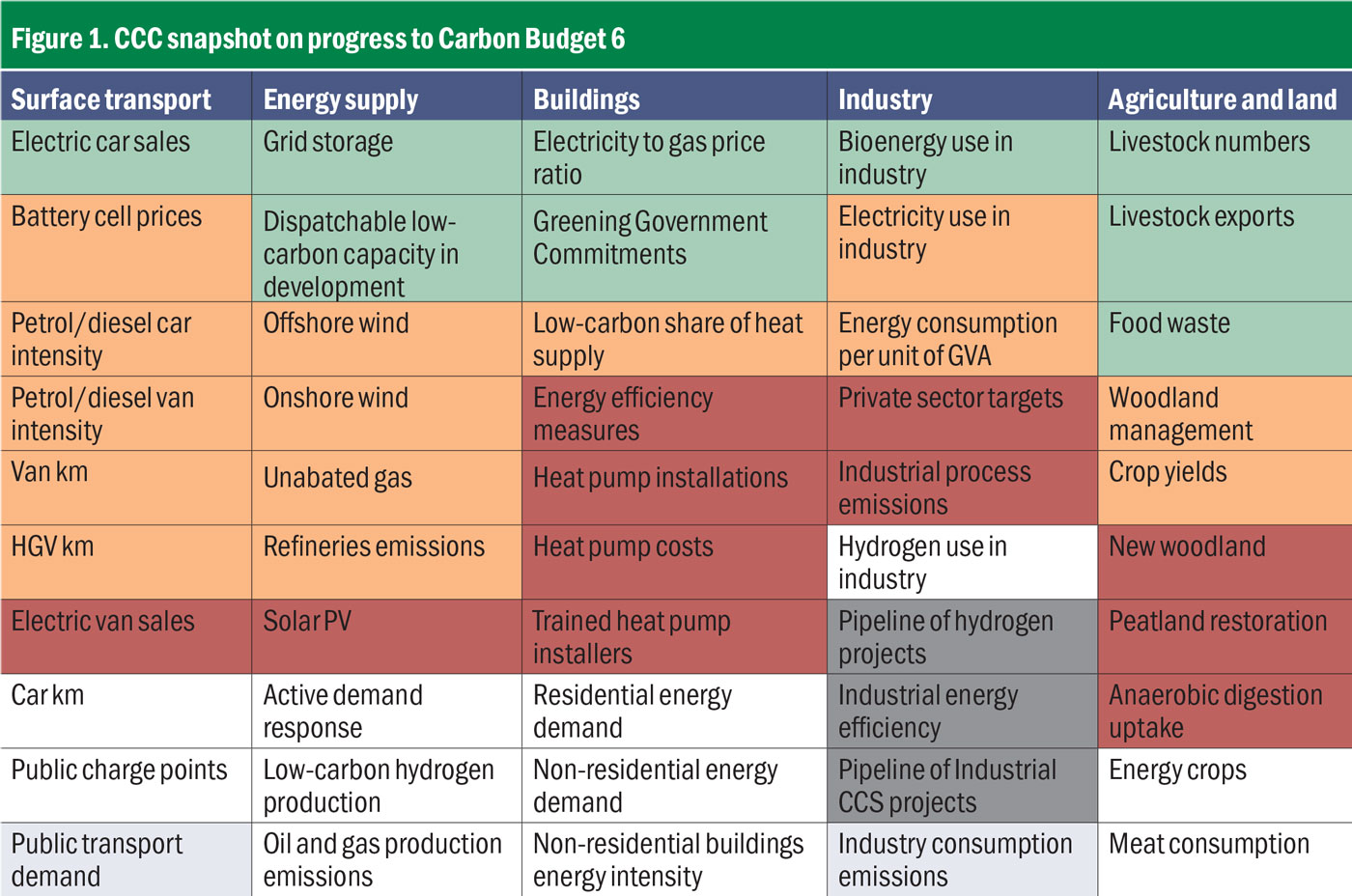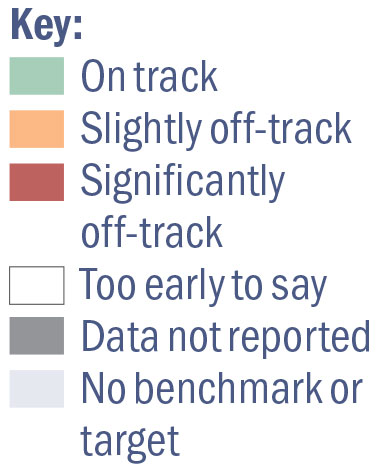FST JOURNAL
Net Zero
DOI: https://www.doi.org/ 10.53289/KYKT6189
Meeting our commitments on climate change
Julia King

The Baroness Brown of Cambridge DBE FREng FRS, Julia King, is Chair of the Climate Change Committee’s Adaptation Committee and Chair of the House of Lords Science and Technology Select Committee. She is an engineer and a Crossbench Member of the House of Lords. A career at Cambridge University and Rolls-Royce plc led to 10 years as Vice-Chancellor of Aston University in Birmingham. She led the 2007 King Review on decarbonising transport for UK Government and chaired the Cambridgeshire and Peterborough Independent Climate Commission.
The weather has been trying to tell us something. Last year in the UK, we experienced temperatures of over 40˚ C. Maximum temperatures in the South East of England are rising by something like 1˚ C per decade. Even more alarming is the fact that September 2023 was, globally, 1.75˚ C above pre-industrial levels – in contrast to the Paris target of staying below 1.5˚ C. 2023 is likely to be, on average, 1.4˚ C above pre-industrial and that is before El Niño has really got started. There should be a huge urgency about taking action on climate change.
As a result of the Climate Change Act, there are currently six legislated carbon budgets, which take us to 2037. We have met the first three, but not entirely by our own efforts. Meeting the first was made easier by the global financial crash, meeting the third was assisted by the impact of Covid.
The primary factor driving our emissions reduction up to 2019 was decarbonising the electricity system. As we have emerged from the pandemic, emissions associated with some sectors – notably surface transport and aviation – have started to rise again sharply. We have seen a significant drop in emissions from residential buildings, although this was predominantly because the price of gas has increased dramatically due to the war in Ukraine.
Rate of progress
Over the past eight years, the UK has been reducing emissions by about 3% a year. To meet the 2030 goal, that will have to increase to almost 6% a year. Much of the progress so far has come from decarbonising the electricity system, which has been relatively simple and people have not had to change their behaviour. Strip out the benefits of taking coal off the system and we have only been reducing emissions across the rest of the economy by a little more than 1% a year.
To reach the 2030 goal means reducing emissions around four times as fast. That will require engagement with people, a very strong focus from Government and some very effective policy delivery. Industry needs to more than double its rate of reducing emissions, surface transport needs to quadruple it. Buildings, fuel supply – these big emitters need to double the rate they have achieved to date. Industry, in particular, takes a long time to make investments to change major processes, so there is almost no time left to get the very significant change needed in our industrial processes.
The Net Zero Strategy was published in 2021. The Government was taken to court and the judgement handed down was that it needed to have a strategy where it was clearer how policy would deliver the emissions reductions. The Carbon Budget Delivery Plan was published early in 2023. There is a significant difference between the two documents in regard to surface transport – the contribution in the new plan is much lower. There are two contributors here.
First, the Government realised that the benefits of hybrid vehicles will be nothing like as strong as hoped. The emissions from plug-in hybrids will be significantly greater than expected. We should therefore move to fully-electric vehicles as quickly as possible.
The other factor is that the Government chose not to take any benefit from a potential reduction in driving. There has been a 5% reduction in kilometres-driven since Covid. However, it is not clear if this is a trend or something more temporary, so the Government has chosen not to take any account of that. Therefore, transport emissions in 2030 are projected to be significantly higher in the Government’s new planning. Other areas will have to find additional reductions if the overall target is to be met.
The Climate Change Committee (CCC) has said it is confident the UK will meet the fourth carbon budget (CB4), the one for the mid-2020s. A major reason for that is actually that 5% drop in kilometres-driven. There is, however, much less confidence about CB5 (which is also our Nationally Determined Contribution under the UNFCCC) and CB6 due to be delivered in the mid-2030s.
 Figure 1. CCC snapshot on progress to Carbon Budget 6
Figure 1. CCC snapshot on progress to Carbon Budget 6

There is a real anxiety that the country is not preparing for the longer term. Looking at the targets by sector, then surface transport and buildings are not on target, nor are industry or agriculture. The Government’s policies and plans for energy supply are, though, more positive.
Indicators
The CCC has developed a set of indicators it now uses to see whether we really are making progress (see Figure 1). Its assessment in June this year highlighted red flags in every one of those areas. So electric van sales are well behind where they need to be. As more deliveries are now made by van, van-kilometres have gone up significantly in the past few years. Heat pumps are a crucial technology but heat pump installations, heat pump costs, trained heat pump installers – all are lagging behind target.
There have been a number of developments since June when the last CCC report was published, including the Prime Minister’s speech in September. While the push back of the petrol and diesel phase-out from 2030 to 2035 was not helpful, the zero emission mandate for car manufacturers is unchanged so there will not be very much difference.
There has been a number of delays to the dates when new gas boiler installations need to be phased out. Again, these will have relatively limited impact as they apply to special cases such as those who live off-grid and have a gas or oil tank in the garden. The increase in the boiler upgrade grant to £7,500 will be helpful.
The announcement in the Prime Minister’s speech about fast-tracking grid infrastructure is hugely important because of the scale of electricity infrastructure we will need. However, the latest round of Contracts for Difference auctions – where there were no bids for offshore wind despite the UK’s target for 50 gigawatts capacity by 2050 – is unfortunate, to say the least. Tata Steel’s decision to switch the steelworks at Port Talbot to electric arc furnaces will improve the outlook for industry. The CCC has published an analysis of the impact of all these announcements, positive and negative.
Our international reputation
The uncertainties caused by these announcements has, though, really damaged our international reputation. The investment in the electricity network over the coming decade has been estimated at between £50-60 billion per year. This country cannot find that level of investment on its own, we need foreign investment. Potential overseas investors now think the UK is backtracking on its commitments. And that is really damaging to our reputation. While that is probably an unintended consequence of the Prime Minister's speech, it may have the most lasting impact.
We must not forget, though, that while mitigation is critical, the temperature will keep rising at best for the next 30 years whatever we do. So mitigation alone is not enough. We need to adapt as well.
